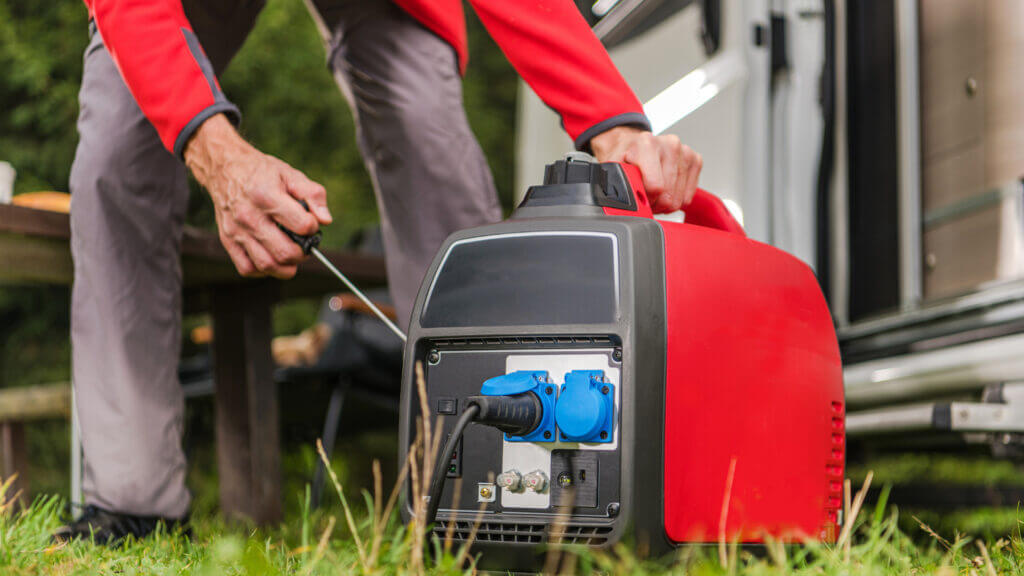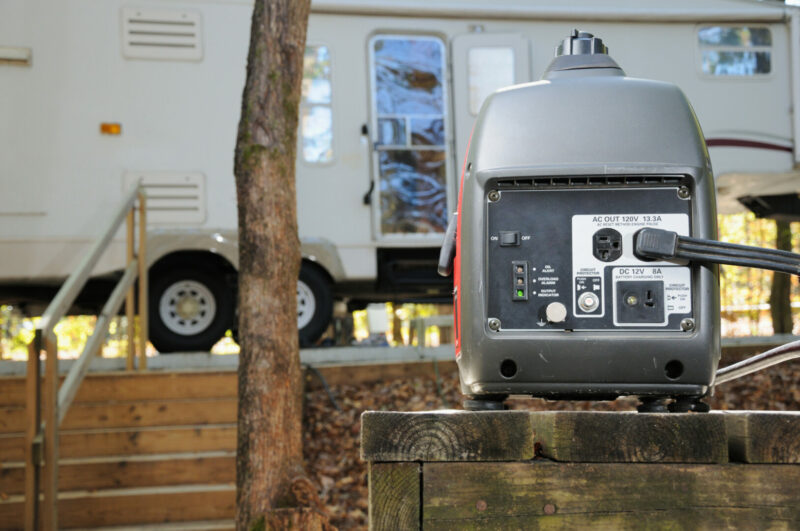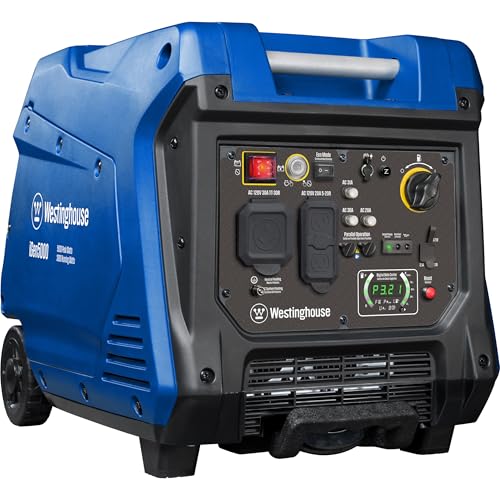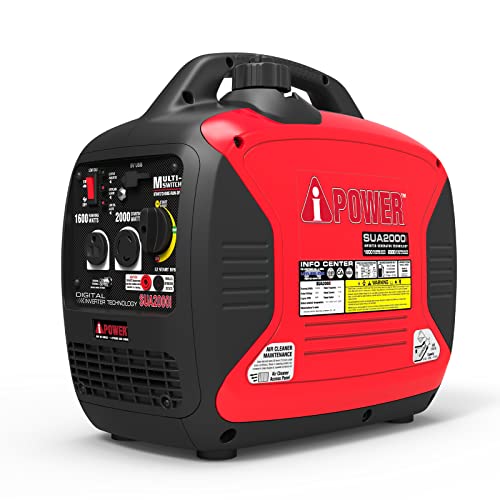Table of Contents Show
Depending on the size of your rig, be it a travel trailer or fifth wheel, choosing the best portable RV generator depends on what you want to power.
Price and brand loyalty play a part in the deciding factor as well. So let’s dive into it; the following are the best portable generators for RVs.
What Is a Portable RV Generator?
A portable generator burns fuel to power an engine that runs an onboard alternator to create electricity. Many generators can power residential appliances or even an entire recreational vehicle.
Generators can produce a limited amount of power for an extended period. You measure the energy output of a generator in watts. The more watts a generator is rated for, the more options you’ll have in terms of power.
Portable generators are incredibly convenient and designed for mobility. That lets them create generous amounts of power and makes them popular among RVers.
You’ll have power for as long as you can keep fuel in the generator’s tank!
What Size Generator Do I Need for My RV?
Consider your power needs when figuring out what size of generator you need. A 3500W generator is an excellent choice for running several items in your RV. It’s comparable to using a 50-amp RV on a 30-amp power service. If you use too much power, the generator will likely shut down to avoid potential damage.
Some RVers opt for purchasing a pair of 2000W generators and daisy-chaining them together. A 2000W generator is considerably lighter and easier to move around. When daisy-chained together, two 2000W generators can produce a tremendous amount of power.
What to Look for in an RV Generator
You may have thought about getting a new generator before but don’t know where to start. Let’s consider a few things you should consider when looking for a generator for your camping needs.
Fuel Type
The three most popular fuel sources for RV generators are diesel, gas, and propane. Some portable generators even use multiple fuel sources, which can be convenient in an emergency.
Many RVers choose gas-powered generators because they’re often cheaper, and gasoline is usually easy to come by. One of the disadvantages of gasoline-powered generators is that they often require more upkeep than other generators. It’s also more dangerous to store gasoline than diesel or propane as it has a lower flash point and a shorter shelf life.
Diesel-powered generators are another popular option. They’re great because they require less maintenance and are more efficient. While there are many benefits to choosing a diesel-powered generator, they’re more expensive and require regular use to avoid breaking down.
One last fuel source that’s popular for RV generators is propane. Many people already have a propane tank or two for grills or heaters around their house.
These generators can use these same tanks or connect to larger tanks, depending on how often you use your generator. Propane is much less efficient than gas or diesel fuel for powering a generator.

Noise Level
Having your epic boondocking trip interrupted by a neighbor’s noisy generator is pretty much every boondocking RVer’s nightmare. When purchasing a generator, factor in the level of noise the generator creates while in use.
The volume difference between a generator under a full and empty load is night and day. The noise levels a generator creates are an essential factor for most campers to consider when shopping for a new generator.
Emissions
Inverter generators have proven a leap forward for portable generator technology. An inverter generator can adapt the engine’s throttle based on demand.
This means generators no longer have to run full throttle the entire time, creating less excess pollution and lower fuel consumption. You’ll save money on fuel and produce less pollution when choosing an inverter generator.
Warranties
When you’re choosing to spend hundreds, possibly even thousands, of dollars on a generator, you want a quality warranty. If you’re planning to use your portable generator while traveling full-time, you’ll want to be able to use your warranty anywhere in the country.
Purchasing your generator from any popular big-box retailer is a great way to ensure your warranty is valid nationwide.
The Best Portable RV Generators On The Market
It’s time to take a closer look at the best generators on the market. It’s important to note that each generator below has an inverter to make clean power, which you can use with electronics like tablets, laptops, and CPAP machines.
1. Champion 4500 Watt Dual Fuel Inverter Generator With Electric Start
- WIRELESS REMOTE START: Start and stop with ease from up to 80 feet away with the included wireless remote key fob –...
- QUIET TECHNOLOGY: 61 dBA is great for RVs, tailgating, or camping with 4500 starting watts and 3500 running watts and up...
This beast of an RV generator offers 4500 surge wattage and 3150 running wattage. You can start this generator with recoil or the electric start feature. It can hold 2.3 gallons of gas and connect to propane as well.
It does weigh 103 lbs, so make sure you have the carrying capacity for this generator. This is an excellent option for large RVs as it can run two air conditioners and power your entire RV if needed.
2. Westinghouse iGen4500 Super Quiet Inverter Generator
- 5000 Peak Watts and 3900 Rated Watts at Less Than 3% THD; Telescoping Handle; Gas Powered; Remote Start With Included...
- Features a 5–20R 120V Duplex Household Outlet, an RV-Ready Tt-30R 30 Amp Outlet and Two USB Outlets – Great Choice...
This is another large but affordable RV generator on the list. This model is gas-powered and has a remote start feature. The connections included are a 120V household outlet, a 30 amp RV outlet, and two USB outlets.
The digital display shows fuel level, power output, voltage output, remaining run time, and lifetime hours. Reviewers say this model is a very quiet generator, making it great for boondockers.
3. BILT HARD 4000 Watt Quiet Generator
- Super Quiet: power output 68 dB makes BILT HARD inverter generator became great choice for outdoor RV camping or home...
- Inverter Technology: Using advanced inverter technology this super quiet generator produces a pure sine wave power curve...
This 4000W generator is our third option for high power generators on the list. It’s perfect for toy haulers, fifth wheels, or anyone who wants to power their whole RV. It has an extendable handle and wheels, making moving it around a breeze.
4. Craftsman 2200i Generator
- Built-in Handle for Easy Mobility: Carry with one hand for convenient portability and on-the-go power
- Easy Start: Start/Stop/Choke dial for quick and effortless starting process, getting you powered up in no time
Craftsman offers a range of generator sizes, but this 2200W is great for small travel trailers. It has a built-in handle and weighs 47 lbs. It has 2200 starting watts and 1700 running watts. With 4.5 stars on Amazon, it’s safe to say this is an excellent product.
5. PowerSmart 2200 Watt Portable Generator
- 2500 Peak Watts and 1900 Rated Watts at Less Than 2.5% THD, gas powered, 79cc 4 stroke OHV engine, recoil start
- Fuel Efficiency - gas inverter generator equipped with low-oil shutdown, overload protection and Eco-mode and could...
This generator has a four-stroke single-cylinder engine. This particular model has 2200 starting watts and 1900 running watts. Coming in at 42 lbs, you can take this generator anywhere. A big plus for this generator is that it comes with a 2-year warranty.
6. A-iPower SUA2000iV 2000 Watt Portable Generator
- Produces 2,000 starting watts with 1,600 running watts of clean and safe power for sensitive electronics such as phones,...
- Complete with A-iPower’s “Low idle” technology for an extended run time of 4 hours at 100% load and 7 hours at 50%...
This RV generator weighs an even 50 lbs and offers 2000 starting watts with 1600 running watts. The A-iPower has a 30 amp connection, 20 amp household plug, and a 5V USB plug.
The fuel tank capacity is 1.1 gallons, and this model has a handle for easy transportation. With over 1,700 reviews and 4.5 stars on Amazon, this product is a household favorite.
7. Ford FG2300iS 2300 Watt Silent Series Generator
- 2,3000 Peak Watts/ 2,000 Rated Watts
- Capable of up to 6 Hours of Operation at Half Load on 1.18 Gallons of Fuel
A-iPower offers a portable generator with 2300 starting watts and 2000 running watts. This small but mighty option can run up to six hours at half load and weighs less than 47 lbs.
This is another great model for sensitive electronics as it has Stable Sine Wave Technology that provides pure power. With this generator, you don’t have to worry when charging your cell phone or laptop.
8. Honda EU2200i 2200 Watt Generator
- This popular model can operate a wide variety of appliances, making it perfect for portable use at home, camping, on the...
- So quiet, your neighbors will thank you. The EU2200i operates at 48 to 57 dBA, which is less noise than a normal...
The Honda EU2200i is a small yet mighty unit that provides 2200 surge watts, 1800 rated watts, and 120V. This unit contains inverter technology for safely running electronics. Its Eco-throttle system provides fuel efficiency by using the engine only as much as needed, thus saving gas.
Additionally, the Honda EU2200i can be connected to another inverter generator to get twice the power. This might be the best unit for a first-time generator user with color-coded startup components and a large oil fill and drain setup for more straightforward oil changes.
9. Yamaha EF2200iS 2200 Watt Generator
- Powerful Yamaha 79cc Engine - Provides high power output.
- Yamaha Quiet Technology - Outfitted with Yamaha sophisticated muffler for quiet operation.
The Yamaha EF2000iSv2 has 2200W and uses what they call Smart Throttle, for greater fuel efficiency and noise reduction.
For safety features, it has an electrical overload breaker, which prevents engine damage, and a fuel gauge to make it easy to see when it needs to be refilled. In addition, the inverter system allows the safe charging of devices with built-in microcomputers and those with microcomputer-controlled devices like tools.
10. Champion 3400 Watt Dual Fuel Generator
The Champion 3400 Watt Dual Fuel Inverter uses either gas or propane, making this a very versatile product. It has an electric start and starts easily in cold weather. An optional fuel kit features a 50 amp RV-ready outlet.
This dual fuel model runs on gas; it has 3400 starting watts and 3100 running watts. This generator is very quiet at 59 decibels and has an inverter for sensitive electronics.
It comes with one 120V 30-amp RV plug. There are two 120V 20-amp household outlets and one 12V DC outlet with dual USB adapters. Lastly, the Champion 3400-Watt Dual Fuel Inverter has the power to run two 15,000 BTU RV air conditioners at once!
Where Should You Set Up Your Portable Generator?
A common mistake many RVers make is in the placement of their portable generator. Did you know nearly 900 people died between 2005 and 2017 from carbon monoxide poisoning from a portable generator? Not all of these were RV-related, but placing a generator too close to an RV can be deadly.
When setting up your portable generator, make sure it’s in an open area. Face the generator’s exhaust pipe with the wind, so the exhaust blows away from the RV. Also, keep the generator away from any potential fuel or dry brush to avoid causing a fire.
How to Use a Portable Generator to Charge Your RV Batteries
If your generator works for RVs, there’s a good chance it’ll come with a 30-amp electrical plug. If your RV is 50-amp, you’ll need to use a special adapter to convert to a 30-amp connection.
Powering your RV with a generator will charge your batteries, much like plugging into a power pedestal at a campground does. It can take several hours to charge your batteries, so don’t expect immediate results.
Or plug a battery charger into your generator and attach the jumper cables to your RV’s batteries. Verify that the charger you’re using is a smart charger and will recognize when the battery is full. If not, you could damage your RV batteries, which could be an expensive mistake.
Portable RV Generators Power Your Off-Grid Adventures
We hope this guide helps you find the best portable generator for your needs. It’s important to know what you’re looking for and what you’ll need the generator to do so that you can spend days off-grid using your generator for power.
Eat See RV has a good blog article on this topic if you’re not sure how much power you use. While they are referencing solar in the article, the same math would apply to simply figure out how much power you use for a generator.
Lastly, when looking for generators, make sure to search around for the best prices and set aside a small fund for repairs. Service after the sale is very important if issues should arise!
If you’ve found the perfect portable generator and are ready to go off-grid, be sure to read up on the 11 Mandatory Rules for Boondocking on National Forest Land!
Last update on 2024-07-26 / Affiliate links / Images from Amazon Product Advertising API
















Thanks for the article. We are shopping for a generator and appreciate your take. 👍
(btw…OHV= over head valve)
Your welcome and thank you! Fixed!
Hey Jason, Regarding the Onan P4500i, OHV = overhead valve engine.
Thanks, Fixed!
Hi Jason
First, I wish to thank you for this article. So far you are the first RV/Camper blog to mention Harbor Freights’ generators.
Second, For the money, there is no comparison. Just one thing, The predator 3500 was priced incorrectly, Currently it is selling for $799. I purchased mine for $549 a year ago. I wished I had two in series so I could have the capacity to run both A/C
s and the microwave at the same time as two in series produces more than 50 amp. I do not work for or related to in any manner for harbor freight, I just hate seeing consumers get taken on all the other overpriced generators.
Thanks Jeff, we have been using the Predator 3500 for two years now and love it so try to preach what we practice.
When comparing low-priced units to well-known brands, it may be helpful to study details only found in the user manuals (readily available online). A top brand unit might require oil changes every 100 hours, while a budget unit might need oil changes much more frequently. Not a big deal if you bring the generator along only for occasional use, but if you plan on running the generator daily, you might want to consider the implications of bringing along replacement oil and storage of used oil for your camping trip. Also, power output is diminished at higher altitude. Does the generator still produce enough power for your planned camping location? Can parts be swapped in the generator to make it run better at high altitude? Will the generator run well enough at all locations included in your trip, without needing parts swapped during the trip?